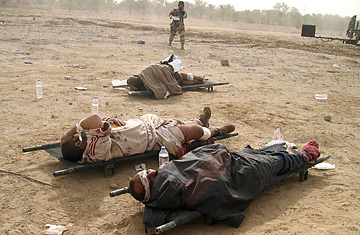
Members of the group, "Soldiers of Heaven" lie on the ground in Najaf after being wounded in a fierce battle with Iraqi troops backed by U.S. forces.
But the details were puzzling. Why would Sunni insurgents, who generally favor stand-off tactics like suicide bombings, mortar attacks and roadside bombs, make a target of themselves by massing hundreds of fighters deep in the Shi'a heartland? Why would Shi'a militias, which thrive on the support of the towns and neighborhoods from which they spring, stake a claim to a patch of farmland outside Najaf?
As information emerges it seems more and more likely that the enemy in the orchards outside Najaf was a cult-like offshoot of Shi'a Islam — men and women who believed the violence in Iraq was not just cataclysmic but apocalyptic. Iraqi officials say they rallied around a man who claimed to be the Mahdi — in Shi'a Islam, a spiritual leader who vanished in the late 9th century and whose return presages a final battle between good and evil. (Sunni Muslims have a quite different conception of the Mahdi, a redemptive figure who will walk the earth to establish peace in the world prior to general resurrection of the dead and the Last Judgment.)
According to Iraqi soldiers involved in the battle and its aftermath, the group's leader, Ahmad al-Hassaani al-Yamani, planned to lead his followers into Najaf and kill the Shi'a religious leaders there. Chief among the targets would have been Grand Ayatollah Ali al Sistani, the most revered Shi'a cleric in Iraq. His rivals slain, al-Yamani planned to lead his followers into the Imam Ali shrine, the resting place of Mohammad's son-in-law and one of Shi'a Islam's holiest sites.
Instead, word of their presence and their plan leaked out and found its way to the Iraqi government, which launched a raid on Sunday that aimed to wipe the group out before it could leave its base. But the fighters of Yamani's Army of Heaven proved better prepared and more tenacious than the Iraqi military had anticipated. The area's orchards are separated from one another by high dirt berms. The Army of Heaven, armed with heavy machine guns, had turned the berms into formidable defensive positions. An Iraqi soldier who participated in the battle said the carnage was reminiscent of Iraq's desperate war of attrition against Iran.
American air power was called in and eventually that helped break the Army of Heaven's resistance. But a U.S. helicopter was shot down, killing two American soldiers. Yamani died along with an unknown number of his fighters; many others were captured. Iraqi officials have offered varying descriptions of the fighters. They were first portrayed as al-Qaeda terrorists. Officials then acknowledged the Shi'a millenarian nature of the Army of Heaven, but still claimed the group was supported by Sunni terrorists and included foreign Arabs of the kind who flock to Iraq to fight under the banner of Sunni jihad.
But an Iraqi colonel told Time that the captured men all seemed to be Shi'a and came from heavily Shi'a areas such as Hilla, Karbala and Diwaniya. Given the chasm between the two groups' religious and political goals, an alliance between al-Qaeda and the Army of Heaven seems far-fetched. It is more likely an attempt to divert attention from unsettling realities. Chief among those realities is the Iraqi Army's inability to defeat a band of cultists without hours of air support from the U.S. military. This speaks to the limits of the Iraqi Army's competence. It may also speak to the ease with which a motivated leader can move through the apocalyptic landscape of Iraq to find weapons and, more importantly, followers willing to use them to bring about the end of the world.
